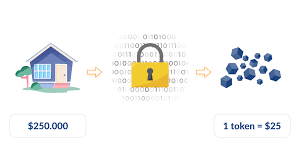
Asset Tokenization for the Cannabis Industry
If you're a cannabis entrepreneur looking to tokenize assets or an investor seeking opportunities in the crypto market, this article will provide valuable insights into the world of asset tokenization
INTRODUCTION TO CRYPTO
CryptoTokin
4 min read


Introduction: Asset tokenization has emerged as a transformative force in the cannabis industry, offering new avenues for fundraising, liquidity, and investment opportunities. In this comprehensive guide, we will explore the concept of asset tokenization, its benefits and challenges, real-world applications in the cannabis sector, and the role of cryptography in ensuring the security and integrity of tokenized assets. Whether you're a cannabis entrepreneur looking to tokenize assets or an investor seeking opportunities in the burgeoning crypto market, this article aims to provide valuable insights into the world of asset tokenization.
Understanding Asset Tokenization: Asset tokenization involves the process of converting ownership rights to a tangible or intangible asset into digital tokens on a blockchain platform. These tokens represent fractional ownership in the underlying asset, allowing investors to buy, sell, and trade them in a transparent and efficient manner. By tokenizing assets, issuers can unlock liquidity, reduce transaction costs, and democratize access to investment opportunities.
Benefits of Asset Tokenization:
Increased Liquidity: Asset tokenization enables fractional ownership of illiquid assets such as real estate, artwork, or cannabis licenses, making it easier for investors to buy and sell them on secondary markets.
Lower Barrier to Entry: Tokenized assets allow investors to participate in high-value assets with lower minimum investment thresholds, democratizing access to traditionally exclusive markets.
Enhanced Transparency: Blockchain technology provides an immutable and transparent ledger of ownership and transaction history, fostering trust and accountability among stakeholders.
Cost Efficiency: Asset tokenization eliminates intermediaries and reduces administrative costs associated with traditional asset transactions, such as legal fees, brokerage commissions, and paperwork.
Global Accessibility: Digital tokens can be traded globally, enabling investors from around the world to participate in asset markets without geographic restrictions.
Challenges and Considerations: While asset tokenization offers numerous benefits, it also presents several challenges and considerations:
Regulatory Compliance: Asset tokenization is subject to regulatory oversight, with legal and compliance requirements varying by jurisdiction. Issuers must navigate regulatory complexities to ensure compliance with securities laws and investor protection regulations.
Security Risks: The digital nature of tokenized assets exposes them to cybersecurity threats, such as hacking, fraud, and theft. Robust security measures, such as encryption, multi-factor authentication, and cold storage, are essential to safeguarding digital assets.
Market Volatility: Tokenized assets may be subject to price volatility and market fluctuations, reflecting broader trends in the cryptocurrency market. Investors should conduct thorough due diligence and risk assessments before investing in tokenized assets.
Investor Education: Asset tokenization is a relatively new concept, requiring education and awareness among investors about its benefits, risks, and potential rewards. Education initiatives and investor outreach efforts can help bridge knowledge gaps and promote informed decision-making.
Real-World Applications in the Cannabis Industry: Asset tokenization holds significant promise for the cannabis industry, offering innovative solutions to longstanding challenges and unlocking new opportunities for growth and investment:
Cannabis Real Estate: Tokenizing real estate assets such as cannabis cultivation facilities, dispensaries, and retail stores enables fractional ownership and access to liquidity for investors. Tokenized real estate platforms streamline the process of investing in cannabis properties while providing transparency and compliance with regulatory requirements.
Cannabis Licenses and Permits: Tokenizing cannabis licenses and permits allows stakeholders to fractionalize ownership and transfer ownership rights securely and efficiently. Tokenized licensing platforms facilitate regulatory compliance and streamline licensing processes for cannabis businesses.
Cannabis Supply Chain: Tokenizing supply chain assets such as cannabis crops, products, and distribution channels enhances transparency and traceability in the cannabis industry. Blockchain-based supply chain platforms provide real-time visibility into the movement of cannabis products from seed to sale, ensuring compliance with regulatory standards and quality control measures.
Cannabis Investment Funds: Tokenizing investment funds focused on the cannabis industry provides investors with diversified exposure to cannabis-related assets, including cultivation, processing, distribution, and ancillary services. Tokenized investment funds offer liquidity, transparency, and flexibility, attracting a broader range of investors to the cannabis market.
Role of Cryptography in Asset Tokenization: Cryptography plays a critical role in asset tokenization, ensuring the security, integrity, and privacy of digital assets and transactions. Key cryptographic techniques used in asset tokenization include:
Digital Signatures: Digital signatures are cryptographic mechanisms that verify the authenticity and integrity of digital transactions. Each tokenized asset transaction is signed with a digital signature, which provides proof of ownership and prevents unauthorized tampering.
Public-Key Cryptography: Public-key cryptography enables secure communication and data exchange between parties without the need for a shared secret key. In asset tokenization, public-key cryptography is used to generate unique digital wallets, authenticate users, and encrypt sensitive information.
Hash Functions: Hash functions are mathematical algorithms that generate fixed-size hash values from input data. Hash functions are used to create unique identifiers for tokenized assets, verify data integrity, and secure transactions on the blockchain.
Conclusion: Asset tokenization represents a paradigm shift in the way assets are owned, traded, and invested in the cannabis industry and beyond. By leveraging blockchain technology and cryptography, asset tokenization offers numerous benefits, including increased liquidity, lower barriers to entry, enhanced transparency, and global accessibility. While challenges and considerations remain, the potential of asset tokenization to unlock value, democratize access to investment opportunities, and transform traditional markets is undeniable. As the cannabis industry continues to evolve, asset tokenization stands poised to drive innovation, foster growth, and create new pathways for investors and entrepreneurs alike.


